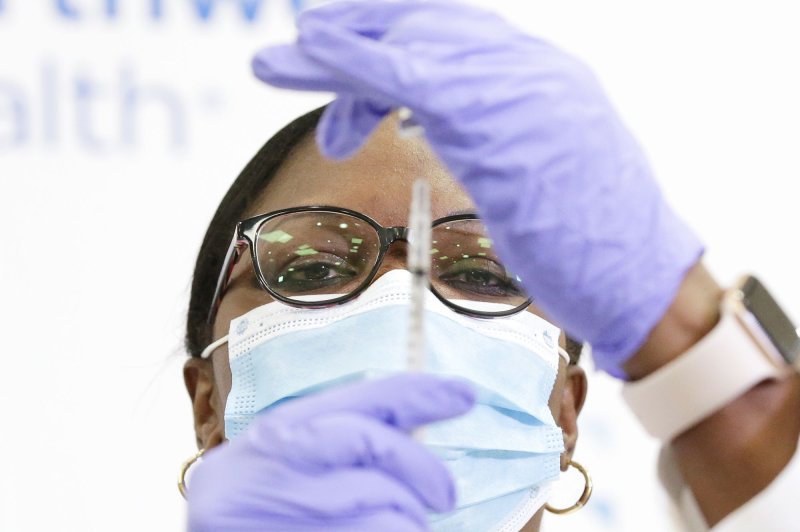1 of 5 | A physician fills a syringe with the fluid from a vial of the Pfizer-BioNTech coronavirus vaccine. File Photo by John Angelillo/UPI |
License Photo
May 25 (UPI) -- COVID-19 vaccines may not be as effective in people who take a drug for rheumatoid arthritis and psoriasis, according to a study published Tuesday by the journal Annals of Rheumatic Diseases.
Up to one in three people on the drug methotrexate failed to achieve an adequate immune response to the vaccines, the data showed.
The study assessed immune response to the two-shot Pfizer-BioNTech COVID-19 vaccine, though the same concern likely applies to the similarly formulated Moderna shot.
"Some medications that depress the immune system in patients with autoimmune and immune-mediated disorders may interfere with the way some people mount antibody responses to [these] vaccines," study co-author Dr. Jose U. Scher told UPI in an email.
"This is true in a proportion of patients, [but] certainly not for the majority of them," said Scher, a rheumatologist at NYU-Langone Hospital for Joint Diseases in New York City, as well as director of the Psoriatic Arthritis Center and the Arthritis Clinic at NYU-Langone.
Autoimmune diseases are those in which the immune system mistakenly attacks healthy cells in the body, including those in the joints or skin, according to the National Institutes of Health.
Examples include rheumatoid arthritis, a disease that causes joint pain, as well as psoriasis, a skin disorder, and multiple sclerosis, a degenerative neurological condition, the NIH says.
Collectively, they are the third most common cause of chronic illness in the United States, behind diabetes and heart disease, and affect between 5% and 8% percent of the country's population, the NIH estimates.
As a result, drugs designed to modify this immune response such, as methotrexate -- rituximab is another example -- are some of the most-used medications in the United States, with more than 5.5 million prescriptions annually, according to the pharmacy data resource ClinicalC.com.
Previous research has shown that methotrexate reduces the immune response to the seasonal flu vaccine, Scher and his colleagues said.
The Pfizer-BioNTech and Moderna COVID-19 vaccines produced an effective immune response in more than 90% of healthy adults in clinical trials, the researchers said.
However, how well the vaccines work in those with autoimmune disorders, or those taking drugs such as methotrexate, remains unclear.
For this study, the researchers assessed the immune response to the Pfizer-BioNTech COVID-19 vaccine in 82 adults with psoriasis and rheumatoid arthritis who were taking methotrexate or a similar drug.
The researchers then compared their immune response to that of 208 healthy adults, they said.
Following vaccination, adequate antibody levels were produced in more than 90% of the 208 healthy participants and 37 patients on biologic or non-methotrexate oral treatments, the data showed.
However, only 62% of the 45 patients taking methotrexate achieved adequate antibody levels after vaccination.
In addition, participants on methotrexate did not experience an activation of T cells, which are a key part of the body's immune defense system.
Still, it's possible that this and other studies are overestimating the negative effects of methotrexate and other drugs on the COVID-19 vaccines "since we don't really know what the right cut off for ... adequacy is," Scher said.
Some people vaccinated while on the drug may "actually see a delayed antibody response" up to two or three months later, he said.
Also, the participants on methotrexate in this study tended to be older than those not on the drug -- average age 63 versus 49 -- "which may potentially explain some differences in vaccine response," according to the researchers.
"Antibody [levels] and cellular immune responses should not be equated with efficacy outcomes or be interpreted as surrogates for actual prevention of COVID-19," Scher said.
"The results from all of these studies cannot be extrapolated to clinical care at this time and until we have larger trials, [so], in the meantime, all patients should continue with the same approach to immunization as," everyone else, he said.
January 31, 2020
National Institutes of Health official Dr. Anthony Fauci (C) speaks about the coronavirus during a press briefing at the White House in Washington, D.C. Health and Human Services Secretary Alexander Azar (L) announced that the United States is declaring the virus a public health emergency and issued a federal quarantine order of 14 days for 195 Americans. Photo by Leigh Vogel/UPI |
License Photo
















